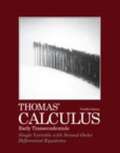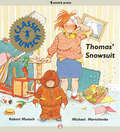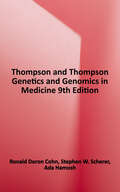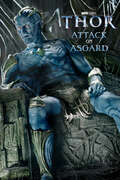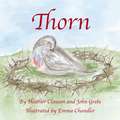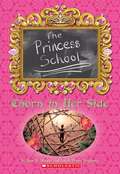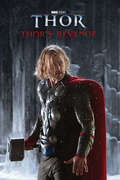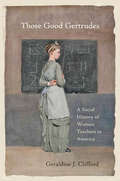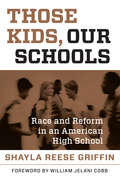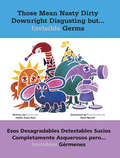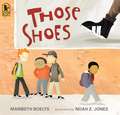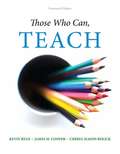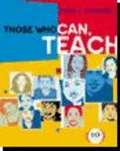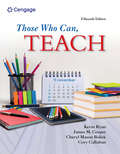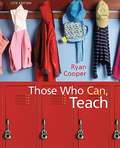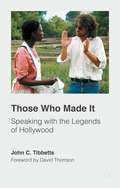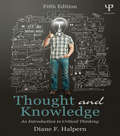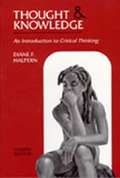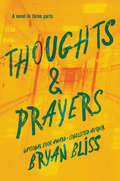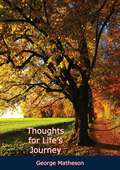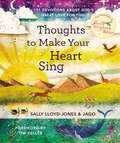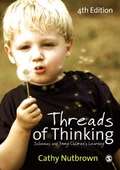- Table View
- List View
Thomas and Gordon (Thomas & Friends)
by Random House C. Reginald DalbyThe very first story about Thomas the Tank Engine, from 1946, is now adapted as a sturdy board book for the youngest readers. Train-loving boys and girls ages 0 to 3 will be captivated by the classic illustrations, which perfectly capture the personalities of Thomas and Gordon in their various moods. A terrific offering for fans of Thomas & Friends.From the Board edition.
Thomas' Calculus, Early Transcendentals, Single Variable with Second-Order Differential Equations (Twelfth Edition)
by Maurice D. Weir Joel Hass George B. ThomasThis text is designed for the single variable component of a three-semester or four-quarter calculus course (math, engineering, and science majors).
Thomas' Snowsuit
by Robert Munsch Michael MartchenkoThomas refuses to wear his new snowsuit despite the pleas of his mother, his teacher, and even his principal.
Thompson & Thompson Genetics and Genomics in Medicine, 9th Edition
by Stephen W. Scherer Ada Hamosh Ronald Doron CohnFirst published in 1966, Thompson and Thompson Genetics and Genomics in Medicine has become an essential textbook for medical students, genetic counseling students, students in laboratory medicine, and more advanced trainees. With its focus on fundamental principles in human genetics and genomics and their application to medicine, the book has served many as a well-thumbed resource they return to over and over. Such students can continue to depend on this valuable text, joining those in newer fields of genome data analysis for all they need to know about genetics and genomics throughout their basic science training, clinical placements and beyond. Coverage includes new discoveries―such as the functional roles of non-coding RNAs, chromatin regulation and epigenetics―latest technologies, and new diagnoses they are enabling. Under an expanded title, this ninth edition has been completely revised by a new editorial team overseeing a large cadre of contributing authors. Support groups have also assisted in updating illustrations featuring beautiful images of those living with genetic conditions. - Comprehensive coverage of: genomes in biology and medicine; copy number and structural genomic variation; novel discoveries; latest technology; and new genetic diagnoses - Over 40 clinical case studies, capturing the latest challenges of variable expression, pleiotropy, and complex disorders through new diagnostic strategies - Full-color text, illustrations, updated line diagrams, and clinical photos - End-of-chapter questions and comprehensive answers to challenge the reader to consolidate the material into practice and prepare for examination - An enhanced eBook version is included with purchase. The eBook allows you to access all the text, figures and references, with the ability to search, customize your content, make notes and highlights, and have content read aloud - Updated and new clinical cases, supported with photography by the not-for-profit organization, Positive Exposure - New content on growing role of sequencing and novel functional assays in diagnosis and screening of genetic conditions - New chapter on Epigenetics - Clearer and more precise terminology, in response to contemporary and evolving guidelines - New sections describing the use (and need for) genetic information from diverse populations, including unique indigenous and founder populations, for diagnosis and management.
Thor: Attack on Asgard (Thor)
by Marvel Press EbookThor is about to be made king of Asgard by Odin Allfather, and the entire realm has come out to celebrate. Yet deep below the Throne Room, an ancient evil awaits. It's sights are set on a weapon so powerful that it could destroy all Nine Realms of the cosmos. Asgard's only hope is the mighty Thor -- but can he survive against the frightening Frost Giants?
Thorn
by John Grebe Emma Chandler Heather ClausonThorn is a bird’s-eye view of Jesus’s last week on Earth — from the triumphal entry into Jerusalem, to the death and resurrection of Christ. <P><P>Thorn adds her songs to the shouts of praise of the crowd gathered on the street as Jesus rides into Jerusalem on a donkey, and she sings songs of comfort to Jesus as he dies on the cross. <P><P>During the week, Thorn has several unique encounters with Jesus and is protected in a surprising way when threatened by a sand cat. Throughout the week, Thorn experiences personal transformation and learns to appreciate a special blessing that is passed on to her babies.
Thorn in Her Side (The Princess School)
by Sarah Hines Stephens Jane MasonWhen Rose gets cast as Princess Perfecta in the school play, Nettle, cast as the Scary Fairy, continues her role off the stage.
Thor’s Revenge
by Elizabeth RudnickThe mighty Thor was set to become king of Asgard until the evil Frost Giants attacked. Now, Thor and his faithful companions -- loki, Lady Sif, and the Warriors Three -- will journey to the frozen realm of Jotunheim to confront these monsters once and for all.
Those Crazy Class Pictures (Junior High #7)
by Kate KenyonSMILE. PLEASE? Boy-crazy Tracy isn't crazy about the way the eighth-grade boys start following her around when her photograph mysteriously appears all over school. Worse, one photo shows her with the boy Nora likes. Tracy's new fame even attracts the attention of Jen's friend Tony, and Mia thinks Andy is a little too interested in Tracy as well! Tracy is famous but friendless, until weird photos of her classmates start appearing, too. Who is taking those crazy class pictures? And why?
Those Good Gertrudes: A Social History of Women Teachers in America
by Geraldine J. CliffordThe definitive book on women teachers in America, told in their own voices.Those Good Gertrudes explores the professional, civic, and personal roles of women teachers throughout American history. Its voice, themes, and findings build from the mostly unpublished writings of many women and their families, colleagues, and pupils. Geraldine J. Clifford studied personal history manuscripts in archives and consulted printed autobiographies, diaries, correspondence, oral histories, interviews—even film and fiction—to probe the multifaceted imagery that has surrounded teaching.This broad ranging, inclusive, and comparative work surveys a long past where schoolteaching was essentially men's work, with women relegated to restricted niches such as teaching rudiments of the vernacular language to young children and socializing girls for traditional gender roles. Clifford documents and explains the emergence of women as the prototypical schoolteachers in the United States, a process apparent in the late colonial period and continuing through the nineteenth century, when they became the majority of American public and private schoolteachers.The capstone of Clifford’s distinguished career and the definitive book on women teachers in America, Those Good Gertrudes will engage scholars in the history of education and women’s history, teachers past, present, and future, and readers with vivid memories of their own teachers.
Those Kids, Our Schools: Race and Reform in an American High School
by Shayla Reese GriffinIn Those Kids, Our Schools, Shayla Reese Griffin examines patterns of racial interaction in a large, integrated high school and makes a powerful case for the frank conversations that educators could and should be having about race in schools. Over three years, Griffin observed students, teachers, and administrators in a “post-racial” exurban high school in the Midwest. In its hallways, classrooms, lunchrooms, and staff meetings, she uncovered the disturbing ways in which racial tensions and prejudices persist and are reinforced. Students engaged in patterns of behavior that underscored racial hierarchies. Teachers—no matter how intellectually committed to equity and diversity—often lacked the skills, resources, or authority to address racial issues, while administrators failed to acknowledge racial tensions or recognize how school practices and policies perpetuated racial inequality. This astute and thoughtful book offers a revealing glimpse into the world of young people struggling with the legacy of racism. More important, it highlights the disservice being done to all students in our schools when educators fail to critically interrogate issues of race. Griffin’s perceptive analysis illuminates the persistent influence of race in our education system and shows how—with appropriate support—teachers and students can develop the capacity to address racial issues and dynamics in schools in a frank and constructive way.
Those Kids, Our Schools: Race and Reform in an American High School
by Shayla Reese GriffinIn Those Kids, Our Schools, Shayla Reese Griffin examines patterns of racial interaction in a large, integrated high school and makes a powerful case for the frank conversations that educators could and should be having about race in schools. Over three years, Griffin observed students, teachers, and administrators in a &“post-racial&” exurban high school in the Midwest. In its hallways, classrooms, lunchrooms, and staff meetings, she uncovered the disturbing ways in which racial tensions and prejudices persist and are reinforced. Students engaged in patterns of behavior that underscored racial hierarchies. Teachers—no matter how intellectually committed to equity and diversity—often lacked the skills, resources, or authority to address racial issues, while administrators failed to acknowledge racial tensions or recognize how school practices and policies perpetuated racial inequality. This astute and thoughtful book offers a revealing glimpse into the world of young people struggling with the legacy of racism. More important, it highlights the disservice being done to all students in our schools when educators fail to critically interrogate issues of race. Griffin&’s perceptive analysis illuminates the persistent influence of race in our education system and shows how—with appropriate support—teachers and students can develop the capacity to address racial issues and dynamics in schools in a frank and constructive way.
Those Mean Nasty Dirty Downright Disgusting but...Invisible Germs: Esos desagradables detestables sucios completamente asquerosos pero . . . invisibles gérmenes
by Judith Anne Rice Reed MerrillEncourage the formation of good health habits in children. Through playful and colorful illustrations, this popular children's book shows the germs that cause illness and how important hand washing is to good health. Includes health information
Those Shoes
by Maribeth Boelts Noah Z. JonesAll Jeremy wants is a pair of those shoes, the ones everyone at school seems to be wearing. Though Jeremy's grandma says they don't have room for "want," just "need," when his old shoes fall apart at school, he is more determined than ever to have those shoes, even a thrift-shop pair that are much too small. But sore feet aren't much fun, and Jeremy soon sees that the things he has -- warm boots, a loving grandma, and the chance to help a friend -- are worth more than the things he wants.
Those Who Can Teach (Fourteenth Edition)
by Kevin Ryan James M. Cooper Cheryl Mason BolickThis book's state-of-the-art and reader-friendly approach will help you make an informed decision about becoming a teacher while inspiring and welcoming them to a rewarding, high-impact career. Using multiple sources, including biographies, narratives, profiles, and interviews with top educators and scholars, the text shows you the realities of teaching.
Those Who Can, Teach
by Kevin Ryan James M. CooperThis dynamic, reader-friendly text helps students make informed decisions about entering teacher education programs. The authors use multiple sources, including biographies and dialogues, to increase student interest and involvement with the material, and encourage students to regard becoming a teacher a positive challenge.
Those Who Can, Teach (MindTap Course List)
by Kevin Ryan James M. Cooper Cheryl Mason Bolick Cory CallahanTake a close look at the challenges, realities and rewards of teaching today as Ryan/Cooper/Bolick/Callahan's THOSE WHO CAN, TEACH, 15E helps you make an informed decision about entering today's teaching profession. This edition's highly acclaimed author team draws from current research and multiple sources to pose the question "Why Teach?" A reader-friendly presentation takes a candid look at the importance of teaching, using compelling narratives, biographies, profiles and interviews with top educators. Video cases portray real teaching experiences and new discussions address technology in use with 2020 pandemic school shutdowns and critical topics, such as bullying, high-stakes testing and education reform. Engaging content corresponds to the latest professional teaching standards with digital downloads that offer teaching tools. The authors invite you to carefully consider the rewards, positive challenges and inspiring experiences that form today's high-impact teaching career.
Those Who Can, Teach (Twelfth Edition)
by Kevin Ryan James M. CooperTHOSE WHO CAN, TEACH, 12/E, is a current, dynamic, and reader-friendly approach to help students make informed decisions about entering the teaching profession.
Those Who Made It: Speaking with the Legends of Hollywood
by John C. TibbettsWhat was it like to work behind the scenes, away from the spotlight's glare, in Hollywood's so-called Golden Age? The interviews in this book provide eye-witness accounts from the likes of Steven Spielberg and Terry Gilliam, to explore the creative decisions that have shaped some of Classical Hollywood's most-loved films.
Thought and Knowledge: An Introduction to Critical Thinking
by Diane F. HalpernThis best-selling textbook, written by award-winning educator and past president of the American Psychological Association, Diane F. Halpern, applies theory and research from the learning sciences to teach students the thinking skills they need to succeed in today's world. This new edition retains features from earlier editions that have helped its readers become better thinkers. A rigorous academic grounding based in cognitive psychology is presented in a clear writing style with a humorous tone and supported by numerous practical examples and anecdotes. Thought and Knowledge, Fifth Edition has been revised to help students meet the challenges of a global neighborhood and make meaningful conclusions from the overwhelming quantity of information now available at the click of a mouse. The skills learned with this text will help students learn more efficiently, research more productively, and present logical, informed arguments. Thought and Knowledge, Fifth Edition is appropriate for use as a textbook in critical thinking courses offered in departments of psychology, philosophy, English, humanities, or as a supplement in any course where critical thinking is emphasized.
Thought and Knowledge: An Introduction to Critical Thinking (4th Edition)
by Diane F. HalpernThis best-selling textbook, written by award-winning educator and past president of the APA, Diane Halpern, applies theory and research from the learning sciences to teach students the thinking skills they need to succeed in today's world. This new edition retains features from earlier editions that have helped its readers become better thinkers. A rigorous academic grounding based in cognitive psychology is presented in a clear writing style with a humorous tone and supported by numerous practical examples and anecdotes. Thought & Knowledge, Fourth Edition has been revised to help students meet the challenges of a global neighborhood and make meaningful conclusions form the overwhelming quantity of information now available at the click of a mouse. The skills learned with this text will help students learn more efficiently, research more productively, and present logical, informed arguments. New features include: *Template for Making Arguments. This is a crucial preparation tool for students in any subject area. For those planning on continuing to Graduate School, this feature is an essential reference. The Graduate Record Examination (GRE) now requires that all test takers write an argument on a contemporary topic. *Concept Maps provide students with strategies to clarify complex information and retain long-term knowledge. *Contemporary Examples,throughout the text, relate current events to the book discussions. *Explanations on How to Evaluate Information found on Web sites. *Revised Student Workbook. Thinking Critically About Critical Thinking, Fourth Edition is filled with new exercises to reinforce learning and practice newly acquired skills. This workbook can be purchased in a student package with the text or as a separate item. Thought & Knowledge, Fourth Edition is appropriate for use as a textbook in critical thinking courses offered in departments of psychology, philosophy, English, humanities, or as a supplement in any course where critical thinking is emphasized.
Thoughts & Prayers: A Novel in Three Parts
by Bryan Bliss"In his unflinching and resonant new novel, Bryan Bliss shows that there is no straight line through trauma, no easy recipe for healing. Instead, in three loosely connected stories of young people bound by an all-too familiar tragedy, he deftly illuminates the small moments of human connection and resolve that might just lead to a place of grace."—Gayle Forman, bestselling author of If I Stay and I Have Lost My Way Fight. Flight. Freeze. What do you do when you can’t move on, even though the rest of the world seems to have? For readers of Jason Reynolds, Marieke Nijkamp, and Laurie Halse Anderson. Powerful and tense, Thoughts & Prayers is an extraordinary novel that explores what it means to heal and to feel safe in a world that constantly chooses violence. Claire, Eleanor, and Brezzen have little in common. Claire fled to Minnesota with her older brother, Eleanor is the face of a social movement, and Brezzen retreated into the fantasy world of Wizards & Warriors. But a year ago, they were linked. They all hid under the same staircase and heard the shots that took the lives of some of their classmates and a teacher. Now, each one copes with the trauma as best as they can, even as the world around them keeps moving. Told in three loosely connected but inextricably intertwined stories, National Book Award–longlisted author Bryan Bliss’s Thoughts & Prayers follows three high school students in the aftermath of a school shooting. Thoughts & Prayers is a story about gun violence, but more importantly it is the story of what happens after the reporters leave and the news cycle moves on to the next tragedy. It is the story of three unforgettable teens who feel forgotten.
Thoughts for Life's Journey: A Book Of Meditations On The Life Of Christ, The Promises Of God, The Christian Character And The Psalms' Guidance
by George MathesonGeorge Matheson offers poignant messages on life and living in this series of reflections upon the divinity of Christ, God's covenant with all of mankind, and the avoidance of wrongdoing and temptation. A superb selection of over 100 distinctive topics on religious and moral themes, Thoughts for Life's Journey is a lively, eclectic book of faith. The topics are wide-ranging, positive themes including the attainment of humility, the good effects of kindness, and the beneficence of belief in Jesus Christ. Cautionary tales and anecdotes, with relevant quotations of Biblical scripture, also abound— many have a moral element intended to imbue mindfulness. Matheson is particularly interested in the many proverbs and life lessons found in the Biblical psalms—dozens of his meditations allude to, or focus chiefly or wholly upon, the wisdom found in these verses. These gems of insight are intended to form a wellspring of knowledge, which the reader can draw upon during times of hardship or difficulty in life.-Print ed.
Thoughts to Make Your Heart Sing
by Sally Lloyd-JonesFrom Sally Lloyd-Jones and Jago, the creators of the bestselling The Jesus Storybook Bible, comes a gorgeous and innovative collection of 101 simple-yet-profound thoughts on faith, to turn the reader&’s eyes toward the God who loves them with a Never Stopping, Never Giving Up, Unbreaking, Always and Forever Love.Thoughts to Make Your Heart Sing shares:Profound spiritual truths from the Bible in a conversational tone—drawing insights from creation, history, and scienceThe writings of great thinkers, preachers, writers, and more—to remind children that God loves them with a Never Stopping, Never Giving Up, Unbreaking, Always and Forever LoveThis wonderful collection:Contains 101 readings on a variety of topics that will help you and your children look at the world in a new, fresh wayTeaches children ages six and up about God&’s love through word and imageIs perfect for family devotions, bedtime, story time, or even as an inspirational companion to The Jesus Storybook BibleIncludes beautiful, colorful artwork on every pageHas a sturdy binding and pages that hold up to years of daily use, even with little handsMakes a wonderful gift for Christmas, Easter, baptisms, and birthdays
Threads of Thinking: Schemas and Young Children's Learning (One-off Ser.)
by Cathy NutbrownFor early childhood educators, Nutbrown (studies in early childhood education, U. of Sheffield, UK) uses the work of Chris Athey to explore ways of understanding children's learning through their schemas, or patterns of behavior and thinking. She gives examples of children trying to make sense of experiences and to reason why things happen, then considers some of Athey's work and questions educators often ask about schemas and young children's learning. She discusses consistency, continuity, and progression in learning; schemas as consistent patterns of behavior, illustrated through three case studies; children's early exploration of ideas that form the roots of mathematical and scientific development and patterns of literacy learning; and implications for curriculum, assessment, and working with parents. This edition includes discussion of the need for professional development, changes in early years pedagogy, and theories of learning in relation to curriculum and teaching practices; new examples of children's drawings and suggestions for using stories to support schemas; and follow-up activities. Annotation ©2012 Book News, Inc. , Portland, OR (booknews. com)

